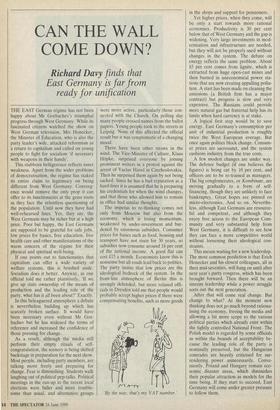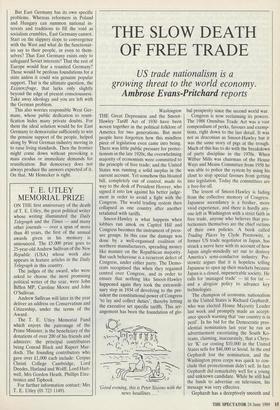CAN THE WALL COME DOWN?
Richard Davy finds that
East Germany is far from ready for unification
THE EAST German regime has not been happy about Mr Gorbachev's triumphal progress through West Germany. While its fascinated citizens watched the show on West German television, Mrs Honecker, the Minister of Education, who is also the party leader's wife, attacked reformism as a return to capitalism and called on young people to fight for socialism 'if necessary with weapons in their hands'.
This stubborn belligerence reflects inner weakness. Apart from the wider problems of democratisation, the regime has staked its entire claim to legitimacy on being different from West Germany. Converg- ence would remove the only prop it can offer to its functionaries at the grass roots as they face the relentless questioning of the population. Until now they have had well-rehearsed lines. Yes, they say, the West Germans may be richer but at a high price. Poor but happy, the East Germans are supposed to be grateful for safe jobs, low prices for basics, free education, free health care and other manifestations of the warm concern of the regime for their physical and spiritual well-being.
If one points out to functionaries that capitalism can offer a wide variety of welfare systems, this is brushed aside. Socialism does it better. Anyway, as one official told me rather plaintively, 'If we give up state ownership of the means of production and the leading role of the party, what has it all been about?' Exactly.
In this beleaguered atmosphere a debate is nevertheless building up which has scarcely broken surface. It would have been necessary even without Mr Gor- bachev but he has widened the terms of reference and increased the confidence of those pressing for change.
As a result, although the media still perform their empty rituals of self- congratulation, the scenery is being shifted backstage in preparation for the next show. Most people, including party members, are talking more freely and preparing for change. Fear is diminishing. Students walk laughing out of political pep-talks. Political meetings in the run-up to the recent local elections were fuller and more trouble- some than usual, and alternative groups were more active, particularly those con- nected with the Church. On polling day many people crossed names from the ballot papers. Young people took to the streets in Leipzig. None of this affected the official result but it was symptomatic of a changing mood.
There have been other straws in the wind. The Vice-Minister of Culture, Klaus 1-1(ipke, surprised everyone by joining prominent writers in a protest against the arrest of Vaclav Havel in Czechoslovakia. Then he surprised them again by not being sacked. Since he has a bad reputation as a hard-liner it is assumed that he is preparing his credentials for when the wind changes, and that those who allowed him to remain in office had similar thoughts.
The impetus to re-thinking comes not only from Moscow but also from the economy, which is losing momentum, weakened by under-investment and bur- dened by enormous subsidies. Consumer prices for basics such as food, housing and transport have not risen for 30 years, so subsidies now consume around 18 per cent of the national income. A good flat can cost £15 a month. Economists know this is nonsense but all roads lead back to politics. The party insists that low prices are the ideological bedrock of the system. In the front-line atmosphere of Berlin this is strongly defended, but more relaxed offi- cials in Dresden told me that people would probably accept higher prices if there were compensating benefits, such as more goods
'By the way, that's my VAT number.'
in the shops and support for pensioners.
Yet higher prices, when they come, will be only a start towards more rational economics. Productivity is 30 per cent below that of West Germany and the gap is widening. Very large investments in mod- ernisation and infrastructure are needed, but they will not be properly used without changes in the system. The debate on energy reflects the same problem. About 83 per cent comes from lignite, which is extracted from huge open-cast mines and then burned in uneconomical power sta- tions that are now creating appalling pollu- tion. A start has been made on cleaning the emissions (a British firm has a major contract) but progress is slow and very expensive. The Russians could provide more natural gas but fraternal help has its limits when hard currency is at stake.
A logical first step would be to save energy. East Germany's• consumption per unit of industrial production is roughly twice the West European average. But once again politics block change. Consum- er prices are sacrosanct, and the system cushions industry from the true costs.
A few modest changes are under way. The defence budget (if one believes the figures) is being cut by 10 per cent, and officers are to be re-trained as managers. The big conglomerates, or Kornbinate, are moving gradually to a form of self- financing, though they are unlikely to face bankruptcy. Great hopes are pinned on micro-electronics. And so on. Neverthe- less, although East Germans are resource- ful and competent, and although they enjoy free access to the European Com- munity and very substantial help from West Germany, it is difficult to see how they can face a more competitive world without loosening their ideological con- straints.
This means waiting for a new leadership. The most common prediction is that Erich Honecker and his closest colleagues, all in their mid-seventies, will hang on until after next year's party congress, which has been brought forward. Then there will be an interim leadership while a power struggle sorts out the next generation.
After that will come real change. But change to what? At the moment new thinking does not go much beyond rationa- lising the economy, freeing the media and allowing a bit more scope to the various political parties which already exist within the tightly controlled National Front. The Polish model is regarded by some officials as within the bounds of acceptability be- cause the leading role of the party is nominally preserved, but the Hungarian comrades are heavily criticised for sur- rendering power unnecessarily. Conve- niently, Poland and Hungary remain eco- nomic disaster areas, which diminishes their popular attraction as models for the time being. If they start to succeed, East Germany will come under greater pressure to follow them. But East Germany has its own specific problems. Whereas reformers in Poland and Hungary can summon national in- terests and traditions to fill the void as socialism crumbles, East Germany cannot. Start on the slippery slope to convergence with the West and what do the functionar- ies say to their people, or even to them- selves? That East Germany exists only to safeguard Soviet interests? That the rest of Europe would fear a reunited Germany? Those would be perilous foundations for a state unless it could win genuine popular support. That is the ultimate question, the Existenzfrage, that lurks only slightly beyond the edge of present consciousness. Take away ideology and you are left with the German problem.
This also worries responsible West Ger- mans, whose public dedication to reuni- fication hides many private doubts. For them the ideal solution would be for East Germany to democratise sufficiently to win the genuine support of the people, helped along by West German industry moving in to raise living standards. Then the frontier might come down without provoking a mass exodus or immediate demands for reunification. But democracy does not always produce the answers expected of it. On that, Mr Honecker is right.











































































 Previous page
Previous page